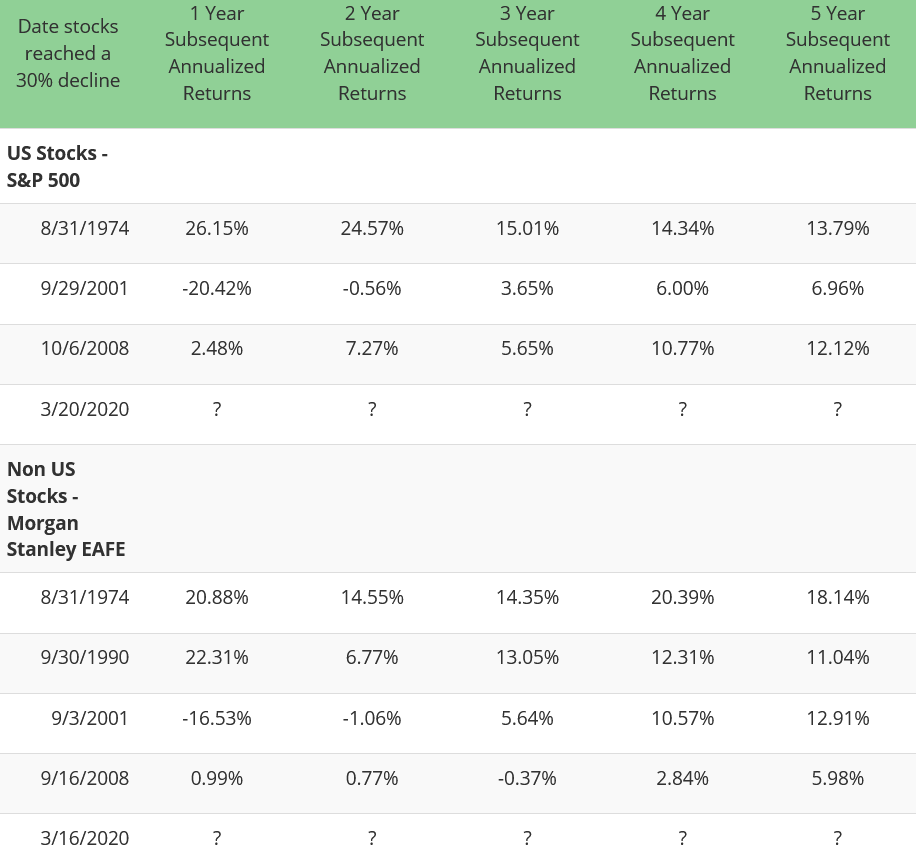“This time is different.” As the saying goes, these are the four most dangerous words for an investor. And yet every time is different.
I have spent the past 35 years giving financial advice and this is now the fifth bear market I have navigated with clients. While the catalyst was never the same, each time presented similar themes and investment behaviors. The most important similarity is there has always been a full recovery for broadly diversified stock portfolios.
While none of us have lived through a pandemic this significant, we do have some historical examples to draw from. Probably the most comparable is the 1918 flu pandemic and as bad as it was, the world did get back to normal.
Bear markets reinforce the value and importance of sound financial planning. One of the key measures we pull from the planning work we do for our clients is their risk capacity. At its core, risk capacity is about only investing in stocks with the portion of the portfolio that will not be needed to support lifestyle in the next 5-7 years. Keeping this margin of safety provides time for stock prices to recover from a bear market. We also use risk capacity to take advantage of opportunity by increasing our allocation to stocks. Investing during a bear market is difficult and feels terrible every time. However, the S&P 500 is 30% cheaper now than it was less than a month ago and we are taking advantage of the opportunity.
The drastic reduction in economic activity we are experiencing right now is vital to slowing the spread of this pandemic so that our healthcare systems can save more lives and provide time for developing treatments and vaccines. While we do not know how effective these efforts to combat this pandemic will be, we do know that we will ultimately get to the other side where there is less risk to our health and recovered economic activity.
Looking at how stocks performed in prior bear markets is a helpful exercise to understand how stocks are likely to perform over the next few years. In the last fifty years, there have been three prior bear markets of 30%+ in the US, and four in non-US developed markets. As can be seen in the following table, in three of the seven cases, stocks had negative returns over the next 2-3 years, but in all seven cases, stocks had positive returns over the next four years, and by the fifth year, annualized returns were between 6% and 18%.

With the current low interest rates, we estimate that cash and bond returns are likely to return between 0% and 4% over the next five years, so stocks are likely to provide significantly higher returns.
While there is limited data from 1918, analysis that has been done indicates that the economy similarly had a significant decline in short term activity but recovered within a couple of years. The most significant impact was the loss of life which appears to have been about 2% of the population. We believe it is likely that our greater health technology capabilities will allow us to have less loss of life.
Governments around the world are also being more proactive with actions designed to blunt the short-term economic impact, and hopefully allow for quicker recovery. While it is impossible to time the bottom of the market with any accuracy, we are taking advantage of the higher future return potential this crisis presents. This is a great time to be a long-term investor.
At Financial Symmetry we are investing the same way for ourselves as we are for our clients. We are here to help you through this period of uncertainty as we believe the only way to benefit from the higher long term returns of equities is to endure their temporary declines. Our staff is all working remotely, diligently reviewing portfolios and long-term plans, and available to answer any questions or concerns you have. We will get through this together.





